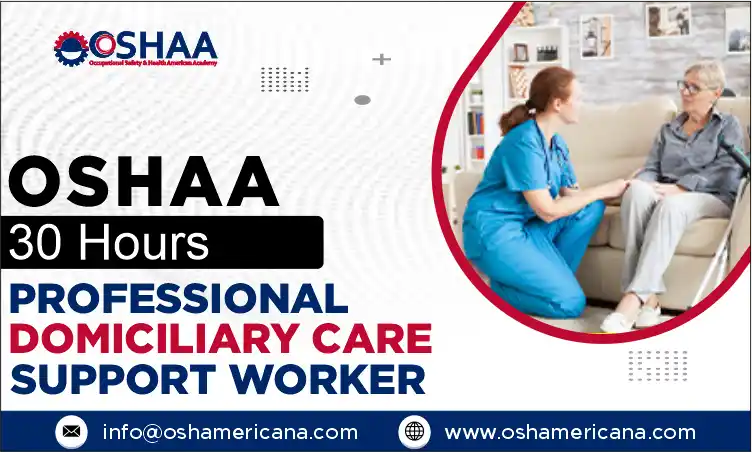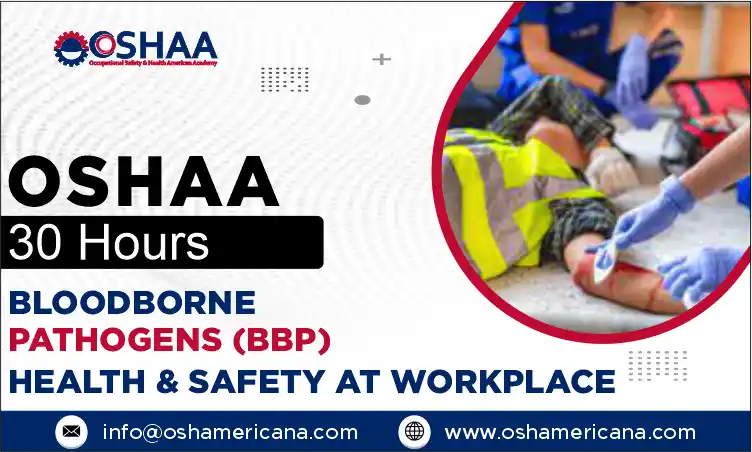Advance your career with the OSHAA 30-Hours Professional Diploma in Domiciliary Care Support Worker, gaining in-depth caregiving skills, safety compliance knowledge, and practical expertise.
The OSHAA 30-Hours Professional Diploma in Domiciliary Care Support Worker is a meticulously designed professional training program for individuals dedicated to providing exceptional care to clients within their own homes. Domiciliary care support workers play a vital role in enabling elderly individuals, people with disabilities, and those requiring extra support to maintain independence, dignity, and safety in familiar surroundings.
This course equips participants with comprehensive knowledge, advanced practical skills, and professional confidence required to deliver high-quality care while adhering to national and international safety, ethical, and regulatory standards. Enrolling in the OSHAA 30-Hours Professional Diploma in Domiciliary Care Support Worker ensures that learners are fully prepared to meet the complex and evolving needs of clients while advancing their career prospects in the domiciliary care sector.
The 30-hour program provides an extensive exploration of the essential responsibilities and competencies of domiciliary care support workers. Learners gain expertise in personal care assistance, mobility support, medication awareness, nutritional guidance, and promoting emotional and psychological well-being for clients. The course places strong emphasis on maintaining a safe and hygienic home environment, safeguarding vulnerable individuals, and adhering to infection prevention and control protocols.
Participants are trained to deliver person-centered care that respects individual preferences, promotes independence, and supports overall quality of life. Ethical caregiving practices, confidentiality, and professional boundaries are reinforced throughout the course to ensure that participants operate with integrity and professionalism in all aspects of domiciliary care.
The OSHAA 30-Hours Professional Diploma in Domiciliary Care Support Worker also provides in-depth training on health and safety compliance, risk assessment, and emergency preparedness. Learners develop the ability to identify potential hazards in home care environments, implement safety measures, and respond effectively to emergencies while maintaining a calm and supportive approach. The course integrates practical scenarios and case studies, allowing participants to apply theoretical knowledge in real-world situations, build problem-solving skills, and make informed decisions that prioritize client safety and well-being.
Beyond practical caregiving competencies, the course emphasizes communication, teamwork, and interpersonal skills. Participants learn strategies for effective collaboration with families, healthcare professionals, and multidisciplinary teams, ensuring a holistic approach to care. The program also covers regulatory frameworks, standards of practice, and best practices in domiciliary care, helping learners achieve compliance with occupational safety guidelines and enhancing organizational performance.
Completion of the OSHAA 30-Hours Professional Diploma in Domiciliary Care Support Worker provides learners with formal recognition and professional certification, enhancing credibility and employability in the domiciliary care industry. Whether starting a career in home-based care or seeking to upgrade existing skills, participants leave the program equipped to deliver safe, high-quality, and compassionate care.
This course empowers care professionals to foster independence, improve client outcomes, and uphold the highest standards of ethical and regulatory compliance. The OSHAA 30-Hours Professional Diploma in Domiciliary Care Support Worker is a critical investment in professional development, ensuring that learners are fully prepared to excel in a growing, essential, and highly respected sector of healthcare.
OSHAA 30-Hours Professional Diploma in Domiciliary Care Support Worker
To enroll in the OSHAA 30-Hours Professional Diploma in Domiciliary Care Support Worker, learners are expected to meet the following criteria:
- Age Requirement – Learners must be at least 18 years of age to ensure maturity and readiness to undertake responsibilities associated with providing domiciliary care. The OSHAA 30-Hours Professional Diploma in Domiciliary Care Support Worker emphasizes practical, real-world caregiving scenarios that require participants to act responsibly and professionally.
- Educational Background – A minimum of a high school diploma or equivalent is recommended for enrollment. Learners with higher education or prior training in healthcare, social care, or related fields will benefit from an enhanced understanding of the concepts taught in the OSHAA 30-Hours Professional Diploma in Domiciliary Care Support Worker. The course is designed to build upon foundational knowledge while ensuring accessibility to all committed learners.
- Work Experience – Previous experience in caregiving or related roles is recommended but not mandatory. The OSHAA 30-Hours Professional Diploma in Domiciliary Care Support Worker is structured to provide comprehensive training for both beginners and experienced care professionals, equipping all participants with the skills, knowledge, and confidence necessary for high-quality domiciliary care.
- English Proficiency – Learners must have the ability to read, write, and communicate effectively in English to fully understand course materials, practical exercises, and regulatory guidelines. Proficiency in English ensures that participants can successfully apply the teachings of the OSHAA 30-Hours Professional Diploma in Domiciliary Care Support Worker in real-world care settings while maintaining compliance with health, safety, and professional standards.
Meeting these eligibility requirements ensures that participants are well-prepared to engage fully with the OSHAA 30-Hours Professional Diploma in Domiciliary Care Support Worker, gain maximum benefit from the program, and apply their learning effectively in domiciliary care environments.
Study Units
Learning Outcomes
The Learning Outcomes for the OSHAA 30-Hours Professional Diploma in Domiciliary Care Support Worker are designed to provide participants with advanced skills, compliance knowledge, and practical capabilities essential for delivering high-quality domiciliary care. This course equips learners with the expertise to support clients safely and effectively, ensuring regulatory compliance, promoting client well-being, and fostering professional development within the domiciliary care sector.
- Introduction to Domiciliary Care (3 Hours)
- Understand the role and responsibilities of a domiciliary care support worker in home-based care settings.
- Recognize the importance of person-centered care and promoting client independence.
- Identify key principles of professional and ethical conduct in domiciliary care.
- Develop awareness of the challenges and complexities involved in supporting diverse client needs.
- Personal Care and Support (4 Hours)
- Demonstrate competence in providing personal care assistance, including hygiene, grooming, and daily living support.
- Apply strategies to maintain client dignity and comfort during personal care activities.
- Understand techniques for assisting clients with varying levels of dependency.
- Integrate safe and hygienic practices while performing personal care tasks.
- Supporting Mobility and Physical Health (4 Hours)
- Assess clients’ mobility needs and implement safe movement and transfer techniques.
- Utilize appropriate equipment and assistive devices to support physical health.
- Promote exercises and activities that enhance mobility, strength, and independence.
- Identify risks associated with mobility challenges and implement preventative measures.
- Communication Skills for Care Workers (4 Hours)
- Develop effective verbal and non-verbal communication strategies tailored to clients’ needs.
- Build trust and rapport with clients through empathetic and professional interactions.
- Recognize and respond appropriately to cognitive impairments and communication barriers.
- Collaborate effectively with families and multidisciplinary teams to ensure cohesive care delivery.
- Health and Safety in Domiciliary Care (4 Hours)
- Apply health and safety regulations and best practices in home care settings.
- Identify potential hazards and implement risk reduction strategies.
- Maintain a safe, clean, and hygienic environment for clients and care workers.
- Respond appropriately to emergencies while prioritizing client safety and well-being.
- Safeguarding and Legal Responsibilities (4 Hours)
- Understand safeguarding principles and the protection of vulnerable adults.
- Recognize signs of abuse, neglect, or exploitation and respond in accordance with legal requirements.
- Maintain accurate records and documentation to support compliance and accountability.
- Apply knowledge of regulatory frameworks and professional standards in daily care practice.
- Emotional and Psychological Support (4 Hours)
- Provide empathetic and effective emotional support to clients experiencing stress, anxiety, or cognitive challenges.
- Recognize and respond to behavioral changes or mental health concerns.
- Foster a supportive and positive environment that promotes psychological well-being.
- Utilize techniques to enhance client engagement, motivation, and quality of life.
- Building Professional Relationships and Teamwork (3 Hours)
- Collaborate efficiently with colleagues, families, and healthcare professionals to deliver integrated care.
- Demonstrate professionalism, accountability, and respect in all work interactions.
- Develop strategies for conflict resolution, teamwork, and constructive feedback.
- Strengthen leadership, communication, and interpersonal skills to enhance care delivery.
Completing the OSHAA 30-Hours Professional Diploma in Domiciliary Care Support Worker prepares participants to lead safety initiatives, ensure full compliance with regulatory standards, and foster a professional, client-centered culture in domiciliary care. Graduates of this course will possess the practical expertise, ethical awareness, and confidence required to provide safe, effective, and compassionate home-based care.
The OSHAA 30-Hours Professional Diploma in Domiciliary Care Support Worker offers extensive benefits designed to enhance the skills, knowledge, and professional competencies of care workers. This course is highly relevant to industry professionals, organizations, and stakeholders seeking to ensure the highest standards of domiciliary care. By focusing on regulatory compliance, workplace safety, client well-being, and professional development, the course empowers participants to provide safe, effective, and compassionate care while advancing their careers in the growing home care sector.
- Advanced Knowledge and Skill Enhancement
- Participants gain in-depth understanding of domiciliary care practices, including personal care, mobility support, and emotional assistance.
- The course equips learners with practical skills to manage daily care tasks efficiently and confidently.
- Care workers can apply evidence-based strategies to improve client outcomes and maintain high standards of care.
- Regulatory Compliance and Legal Protection
- Learners understand relevant legislation, safeguarding regulations, and occupational safety standards.
- Ensures that domiciliary care practices comply with legal and ethical requirements.
- Reduces the risk of non-compliance, legal disputes, and professional liability.
- Workplace Safety and Incident Reduction
- Training includes identification of potential hazards and risk management strategies in home care environments.
- Enhances the ability to prevent accidents, injuries, and health incidents for both clients and care workers.
- Promotes a culture of safety and vigilance within domiciliary care settings.
- Professional Development and Career Advancement
- Participants acquire recognized certification, enhancing employability and career prospects.
- Opens opportunities for progression into senior care roles, supervisory positions, and specialized care sectors.
- Strengthens professional credibility and reputation within the domiciliary care industry.
- Cost Efficiency and Operational Effectiveness
- Well-trained care workers reduce incidents, errors, and inefficiencies in home care delivery.
- Promotes optimal resource utilization and cost-effective care practices.
- Improves organizational performance and client satisfaction, benefiting both employers and care recipients.
- Leadership and Management Skills
- Participants develop the ability to lead small teams, delegate tasks, and coordinate care effectively.
- Enhances communication, decision-making, and problem-solving skills essential for team management.
- Fosters confidence in supervising and mentoring junior care staff.
- Enhanced Communication and Interpersonal Skills
- Training emphasizes empathetic communication with clients, families, and multidisciplinary teams.
- Improves collaboration, trust-building, and conflict resolution within domiciliary care settings.
- Supports effective client engagement, promoting comfort, compliance, and overall satisfaction.
- Emotional and Psychological Support Competency
- Learners gain techniques for providing emotional and mental health support to clients.
- Enhances ability to recognize and respond to stress, anxiety, or cognitive challenges.
- Improves client quality of life and strengthens caregiver-client relationships.
- Emergency Preparedness and Risk Management
- Participants learn to respond efficiently to emergencies, including medical crises or environmental hazards.
- Incorporates contingency planning, evacuation procedures, and first aid knowledge.
- Ensures client safety and reinforces care worker confidence in critical situations.
- Client-Centered Care Excellence
- Emphasizes person-centered approaches, respecting client preferences, independence, and dignity.
- Promotes individualized care plans and adaptive strategies tailored to specific needs.
- Enhances client satisfaction, trust, and overall quality of care delivered.
- Continuous Improvement and Innovation in Care
- Encourages reflective practice, performance evaluation, and adoption of best practices.
- Supports the integration of innovative techniques and emerging standards in domiciliary care.
- Fosters ongoing professional growth and lifelong learning within the sector.
- Health, Hygiene, and Infection Control Proficiency
- Training covers hygiene protocols, safe handling of equipment, and infection prevention measures.
- Reduces the risk of cross-contamination and maintains a safe environment for clients and care workers.
- Ensures compliance with health and safety standards while promoting well-being.
- Ethical and Professional Conduct
- Reinforces professional boundaries, confidentiality, and ethical decision-making in home care settings.
- Prepares learners to navigate complex situations while maintaining integrity and professionalism.
- Strengthens trust with clients, families, and organizations.
- Enhanced Productivity and Workforce Well-Being
- Care workers equipped with knowledge and skills perform duties efficiently and confidently.
- Reduces stress, burnout, and errors, contributing to a more sustainable and productive workforce.
- Encourages a positive work environment that supports staff retention and satisfaction.
- Organizational Reputation and Client Trust
- By employing well-trained staff, organizations can demonstrate commitment to high-quality domiciliary care.
- Enhances public confidence, regulatory credibility, and brand reputation.
- Strengthens relationships with clients, families, and healthcare partners through consistent, reliable care.
The OSHAA 30-Hours Professional Diploma in Domiciliary Care Support Worker comprehensively prepares participants to deliver exceptional care, maintain regulatory compliance, and lead in the domiciliary care sector. Graduates of this course emerge with enhanced professional capabilities, practical expertise, and the confidence to provide safe, effective, and compassionate support to clients in home care environments.
The OSHAA 30-Hours Professional Diploma in Domiciliary Care Support Worker is expertly designed for individuals and professionals seeking to advance their skills in providing high-quality home care services. This course is highly relevant to healthcare professionals, domiciliary care providers, social care organizations, and stakeholders committed to safe, effective, and compliant care delivery.
Emphasizing global standards, OSHAA compliance, and professional development, the OSHAA 30-Hours Professional Diploma in Domiciliary Care Support Worker equips participants with the knowledge, practical skills, and confidence required to deliver exceptional domiciliary care while maintaining safety, legal compliance, and ethical standards in home-based care environments.
- Domiciliary Care Workers
- Professionals responsible for supporting clients with daily living tasks in their own homes.
- The OSHAA 30-Hours Professional Diploma in Domiciliary Care Support Worker strengthens skills in personal care, mobility assistance, and emotional support.
- Learners gain expertise in implementing OSHAA safety protocols and maintaining compliance with regulatory standards.
- Enhances confidence and competence in providing client-centered domiciliary care effectively and safely.
- Healthcare Assistants
- Assist nurses and other healthcare professionals in delivering domiciliary care.
- The OSHAA 30-Hours Professional Diploma in Domiciliary Care Support Worker provides advanced knowledge in safe care practices, safeguarding, and client health monitoring.
- Promotes compliance with occupational safety and OSHAA standards while improving client outcomes.
- Builds professional communication, teamwork, and caregiving skills specific to domiciliary care.
- Registered Nurses and Senior Care Staff
- Supervise domiciliary care programs and ensure quality of care delivery.
- The OSHAA 30-Hours Professional Diploma in Domiciliary Care Support Worker equips leaders with tools for effective oversight, risk assessment, and care planning.
- Enhances leadership capabilities while ensuring compliance with OSHAA regulations and best practices.
- Supports professional development and ethical care delivery in home care settings.
- Family Caregivers
- Individuals providing care to relatives or loved ones at home.
- The OSHAA 30-Hours Professional Diploma in Domiciliary Care Support Worker delivers practical skills for safe personal care, mobility support, and emotional management.
- Strengthens understanding of OSHAA regulations, safety protocols, and best practices for domiciliary care.
- Empowers family caregivers to provide structured, compliant, and compassionate support.
- Care Managers and Coordinators
- Professionals responsible for planning, coordinating, and managing domiciliary care services.
- The OSHAA 30-Hours Professional Diploma in Domiciliary Care Support Worker provides knowledge of care management, staff supervision, and operational efficiency.
- Supports regulatory compliance and ensures high-quality client services.
- Enhances decision-making and strategic planning in domiciliary care delivery.
- Social Care Practitioners
- Assess client needs and implement care plans in home care settings.
- Learners gain skills in client-centered care, safeguarding, risk assessment, and compliance with OSHAA standards.
- Enhances ability to support vulnerable clients safely and effectively.
- Promotes professional conduct and adherence to domiciliary care regulations.
- Occupational Therapists and Physiotherapists
- Provide rehabilitative care and mobility support in domiciliary environments.
- The OSHAA 30-Hours Professional Diploma in Domiciliary Care Support Worker strengthens knowledge of safe handling, mobility techniques, and environmental safety.
- Supports adherence to OSHAA safety standards while improving client outcomes.
- Facilitates collaboration with healthcare staff and domiciliary care teams.
- Home Care Agency Staff and Administrators
- Oversee operations, staff management, and service quality in domiciliary care agencies.
- The OSHAA 30-Hours Professional Diploma in Domiciliary Care Support Worker improves knowledge of safety compliance, client service quality, and operational management.
- Enhances organizational efficiency and ensures staff adherence to OSHAA and legal standards.
- Equips teams to monitor, evaluate, and maintain high-quality domiciliary care practices.
- Community Health Workers
- Provide outreach and support to clients in domiciliary care settings.
- The OSHAA 30-Hours Professional Diploma in Domiciliary Care Support Worker develops expertise in risk management, emergency preparedness, and client engagement.
- Ensures compliance with occupational safety and ethical standards.
- Promotes professional communication and relationship-building with clients and families.
- Aspiring Care Professionals and Trainees
- Individuals beginning a career in domiciliary care or related sectors.
- The OSHAA 30-Hours Professional Diploma in Domiciliary Care Support Worker delivers foundational and advanced skills for safe, client-centered care delivery.
- Enhances employability, professional credentials, and readiness to meet OSHAA and industry standards.
- Prepares learners for career growth in the domiciliary and community care sector.
The OSHAA 30-Hours Professional Diploma in Domiciliary Care Support Worker ensures participants across all roles acquire essential knowledge, advanced practical skills, and recognized certification to provide safe, compliant, and high-quality domiciliary care. By completing this course, learners gain the confidence, expertise, and professional credibility to excel in domiciliary care, improve operational efficiency, and foster a safe, client-focused, and compliant home care environment.







